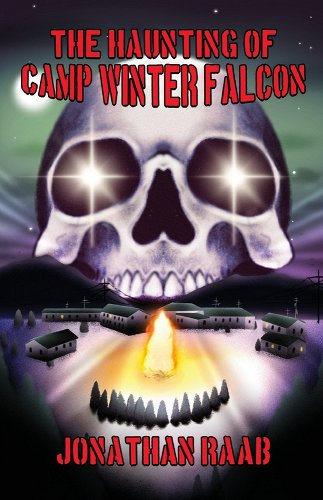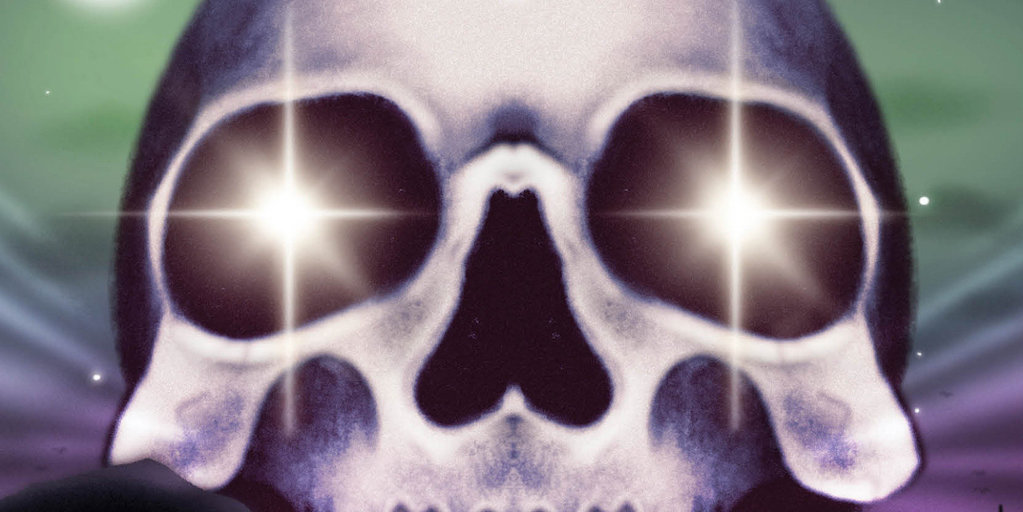The Haunting of Camp Winter Falcon is the most disturbing thing Jonathan Raab’s ever written. It’s also possibly the best.
Given that Raab has carved himself out a space in horror as both the writer and editor of a whole deranged universe of surreal, psychedelic horror, this is no mean feat. The man has a gift for mind-shredding cosmic horror, high strangeness, and a unique form of media blending that means a book or a story can go from traditional narrative to found-footage transcript on a dime. But while Camp Winter Falcon might offer some familiar sights for fans of Raab’s work (and an excellent primer for those who haven’t yet had the pleasure,) the brutal, pulsating brain at the center of Winter Falcon is the way Raab seamlessly melds a frank, authentic depiction of its veteran protagonists’ PTSD into the horror narrative. It’s a depiction that will be familiar to anyone who’s undergone psychological trauma, and it grounds Raab’s usual high strange conspiracy horror with an unsettling note of reality. It’s that grounding note, that emotional truth, that turns a bizarre horror story about an unorthodox psychiatric program into an utterly devastating horror experience with sharp, incisive teeth.
In the Colorado mountains, a small group of military veterans suffering from PTSD arrive for one last chance at living a normal life. The volunteers of Group 001 are here for a three-week course of experimental therapy at a former military facility, Camp Winter Falcon. But something is off about the program: Why are the patients threatened whenever they try to leave? Why does the program director Dr. Glasse keep showing footage of sinister occult rituals and military experiments? And what’s that luminescent green fog and those odd purple lights that appear nightly above Camp Winter Falcon? As Group 001 continues their treatment and Glasse’s methods get stranger, something from within the camp and outside our reality tries to make contact, and the true purpose of their “therapy” peels back reality layer-by-layer, forcing them to discover the truth before it shreds their very sanity.

There is a frankly upsetting level of authenticity to the PTSD in The Haunting of Camp Winter Falcon. Right from the moment you get to know the patients of Camp Winter Falcon, they’re willing to talk about anything in their lives with each other–gruesome violence, self-harm, addiction, night terrors, being closer to death than anyone ever should be–because they’re among people who, to some degree, understand. But they also speak around, and in a more vague sense, about, their particular raw spots. While they’re desensitized to all manner of horrible things, vulnerability is something that doesn’t come easily. The expressions of pain are subdued, something talked about during breaks and circled around during therapy. It’s something anyone who’s gone through treatment for mental illness will find familiar–the boilerplate questions from therapists with the same snarky answers (“Why are you here?” “You mean existentially?”), the missing time, and intrusive thoughts are all terrifyingly accurate. The idea of subconscious defense mechanisms like “screen memories” covering more traumatic events, and periods where you feel like you can’t trust your own memories are similarly familiar. There’s even an obvious schism between the program’s head, Dr. Glasse, with her detached clinical dialogue and odd bursts of religious fervor, and the more subdued and grounded patients, further outlining her as someone who hasn’t “been through it” but still trying to apply her entirely theoretical methods. Even when the alien gods and ghosts start manifesting due to the “therapy” and “resonance rituals” late into the book, they still take the form of things recognizable in PTSD: internalized loathing projected onto friends and others, vivid suicidal ideation, and surreal and violent nightmares that seem plucked right from the patients’ brains.
The sense of being caught in an uncaring universe full of alien gods, supernatural phenomena, and rampant conspiracy meshes perfectly with the idea of an uncaring system trying untested treatment methods on a group of traumatized people who only sort of volunteered for the process. From the beginning, Raab blurs the line between the grounded horrors of confronting one’s traumatic experiences and the outright supernatural elements by having moments where supposedly automated tests talk back to the patients and address them by name or having patients view bizarre found footage of government and occult experiments. Raab even manages to incorporate a familiarity with horror fiction (and with his own work, as Winter Falcon continues the tradition of side-references connecting Raab’s oeuvre) to put the reader in a mild state of hyper-vigilance about what’s coming next and the true sinister purpose of the numerous bizarre “experimental therapies.” By the time the bottom has completely dropped out, it leaves you in a place where you know how the book plunged into the acid-trip dimension, but it’s still a wholly alien experience. It’s disorienting for things to suddenly plunge into the surreal, but the way the book seamlessly flips between the patients’ hallucinations, the equally deranged supernatural phenomena, and the more baseline horror of dealing with PTSD in an uncaring system (especially one that turns into a cosmic horror scenario) makes it all the more disturbing.
Cosmic horror has long been about dealing with the idea that you are a bug in a vast uncaring system that needs to be either fixed or deleted entirely, and to layer that atop an actual uncaring system that sees you as a problem to be solved or shuffled out of sight, something to be tested until you’re either fixed, broken in the right way, or broken enough they can throw you out, just underscores that feeling of isolated horror against the vastness of the monsters. The threats in the book feel as immense as they are alien, Raab’s vivid and insane descriptions of many-eyed, many-mouthed horrors and government experiments painting the picture of a truly unknowable universe. The final onslaught against both Camp Winter Falcon and against reality throws everything into whirling disarray as it violently separates those who believed in a solution against those who tried to use the tools they were given to find their own solutions. It’s vast, it’s insurmountable, and it’s utterly terrifying. It also underlines a truth of post-traumatic stress that absolutely must be engaged with more:
There’s no fucking “fixing” people.
The Haunting of Camp Winter Falcon ends with the world utterly changed, with its protagonists utterly changed, but wisely recognizes that there’s going to be both “better” and “worse” to all of it. The world is still full of monsters and terrifying things that will beat you down in their own unique way. Attempts to “fix” or “cure” the issues rather than providing proper support and guiding others so they can find their own methods to work through their pain and manage things is always dangerous. Those who survive to the final pages of Camp Winter Falcon do so because they can engage with those raw and vulnerable spots, because they are more prepared to deal with the horrifying things in their lives and confront their own personal struggles. The world is changed, they are changed, but the former patients go out to deal with it as best they can.
If that sounds relentless and kind of devastating, it is. It’s definitely a book with teeth, and a book that knows where to sink them in, regardless of how wild it gets. But it’s got teeth because it’s true to some extent. It’s an unflinching look at trauma and attempts to treat it, even as it’s blended with government conspiracies, psychedelic drugs, and surrealistic violence. In fact, those things just illustrate and heighten the everyday horrors depicted on the page. It’s a sharp, incisive comment about those the system fails over and over and over again, and those who have to deal with the fact that they’re irrevocably changed even as the world seems to remain the same. It’s twisted and wild, it’s a read that will leave you breathless, but it’s most of all honest and raw.
And that’s probably the scariest thing about it.



